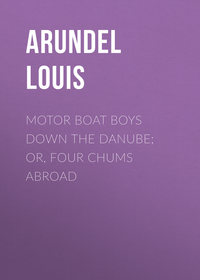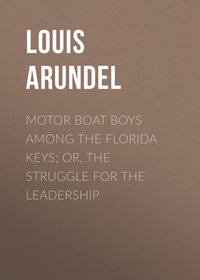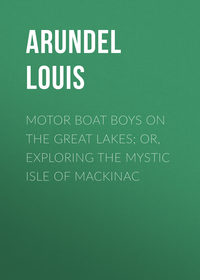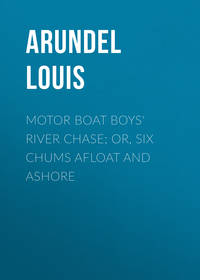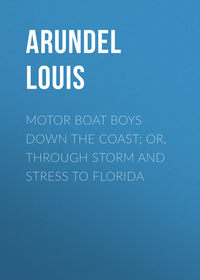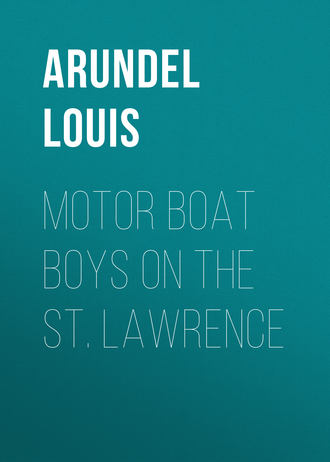 полная версия
полная версияMotor Boat Boys on the St. Lawrence
Jack may have allowed the mystery of the suspected “leak” to crop up in his active mind from time to time after that; but he knew just how sensitive Buster really felt over it, and he always religiously refrained from ever introducing the subject.
Some of the other boys of course must have discussed it as the days slowly passed; but they too seemed desirous that their fat chum might not have his feelings further injured, and nothing was said in his presence. But all the same Buster did not forget, as Herb was fated to learn to his sorrow.
CHAPTER III – A CHANCE CLEW
“Why, hello Jack!”
It was the first day of vacation, and being at the tail end of the week, the motor boat club had wisely decided to defer their departure until the following Monday morning, when they would say goodbye to the home town, and start across the state for Milwaukee.
The speaker was no other than Clarence Macklin; and Jack had come face to face with his bitter enemy upon the main street of the town, as he passed out from a shop where he had been making a little purchase.
Clarence was smiling, after his usual manner; but there was always something crafty about this look of his that made most boys suspicious. Had he been given his choice in the matter Jack would have passed on with a mere nod; for he did not believe in pretending to show anything like friendliness toward this tricky lad, who had once tried to get into the motor boat club, and been blackballed, a fact he had vowed to get even for if it took him a year.
But Clarence evidently had a reason for wishing to talk with the other. He even thrust himself squarely in Jack’s way; and the latter saw no reason why he should avoid an encounter.
“Well,” continued Clarence, “I suppose you fellows are in high feather, now that vacation has come, and you can break away?”
“Sure we are,” replied Jack, trying to seem good-natured; though secretly he was wondering what the other had concealed up his sleeve, and why he insisted on stopping him in this way; for it happened that just a day or so before Jack had been reading that good old precept of warning, to “Beware of the Greeks bearing gifts.”
“And I suppose, also, you mean to get away soon?” Clarence went on.
“Monday sees us off, unless something we don’t look for detains us,” was Jack’s response, as he watched the play of emotions on the face of the other, and noted how the pretense of friendliness was fading away.
“Well,” Clarence suddenly burst out with, “I just wanted to let you know what me and Joe Brinker think of your sly trick in finding out where we meant to go this summer, and then arranging to copy after us! It was just what I’d expect such low-down sneaks as Herb Dickson and George Rollins to do; but I am surprised to know how you fell in with such a dirty game, that’s what!”
Really, Jack never had a greater shock in all his life than when Clarence said this. It seemed to almost take his very breath away.
“Now, do you know, Clarence,” he said, steadily, watching that sarcastic face, “the shoe seems to be on the other foot with us. To tell the truth, we’ve been believing all this time that you’d copied after us. In fact, poor Buster has been suspected of giving our secrets away, not intentionally, of course, just because he was seen talking with you. Queer, ain’t it, how great minds often run in the same channel; and both of us thought of going to the St. Lawrence this summer.”
“Aw! now you’re just trying to crawl out of a hole,” the other sneered. “But you needn’t think you can spoil our summer fun for us, if you are six to two. I told my dad about it, and he advised me to go on, regardless. Just make up your minds to keep clear of Joe and me, if you know what’s good for you!”
Even while the other was saying this there suddenly flashed upon Jack’s mind the true reason for his being held up in this way by “Tricky Clarence,” as young Macklin had come to be known among the boys of the town.
He wanted to rub it into Jack, and exult in the consternation which he expected his declaration would cause in the other’s mind. But there was undoubtedly something more than this. If trouble did follow the meeting of the rivals among the many channels of the Thousand Islands, Clarence wished to make it appear that he and Joe were the aggrieved parties, and that they had been actually set upon by the members of the motor boat club, who had a grudge against them of long standing.
It was a clever bit of sharp practice, worthy of a shyster lawyer. Perhaps Clarence may have inherited some of the shifty trickery by which his respected father had laid the foundation to his big fortune in the wilds of Wall street.
But Jack had no desire to stand there and enter into a wordy war with Clarence, who had a ready tongue, and never cared very much where it led him.
So instead of taking up the challenge, as Clarence doubtless wanted him to, Jack simply elevated his eyebrows, and remarked:
“Oh! is that so? Well, I’m going to tell you just one thing for good and all, Clarence. Neither myself, nor any one of the club, want to set eyes on you or Joe; and if it rests with us, we’ll not run across each other all summer. But, understand me,” and his eyes flashed dangerously, “we mean to strike back, and if there’s trouble it will have to be of your seeking. You can have all you want of it. Now, that’s enough. I’m done talking.”
Clarence hardly knew what to say. He looked at the other as though tempted to blurt out the ugly things he had passing through his mind. But somehow he realized that it would not be safe pressing Jack Stormways too far. He was not the fighter Bully Joe had always been; for as a rule he managed to get some one else to carry out his battles for him. And Jack looked really dangerous just then.
“Pooh! words come cheap with some fellows,” he muttered, as he turned away. “But you’ll find they cut no figure with my partner and me. As to our keeping away from any particular spot you chumps choose to patronize, that for your silly warning,” and he derisively snapped his fingers, for he was now twenty feet away.
Jack held himself in with an effort. He felt in a humor to have given the exasperating Clarence the drubbing he deserved; but it would hardly be nice to create such a disturbance of the public peace so soon before they expected to leave home. If it seemed fated that he must teach this contemptible fellow the lesson he so richly deserved it might be wise to wait until they were far away from the town where they lived.
He was looking after the departing Clarence when he saw him take out his handkerchief to wipe his forehead, for the day was warm.
Something fell to the ground, something that, even at that distance reminded Jack of a yellow telegram blank. He could just as well walk from the sporting goods store in the direction Clarence had gone as any other way. And it was his full intention to call after the other, if the paper seemed worth while.
So, in this spirit Jack bent down and secured possession of the crumpled yellow paper.
Just as he had expected it was a telegraph blank, written on but not signed. It seemed to be a message that some one had started, and upon making a mistake in the wording had crammed in his pocket while he started afresh.
That some one, of course, could only be Clarence, since the paper had fallen to the ground at the time he took out his handkerchief.
Ordinarily Jack would not have been guilty of looking at a telegraph message that had come into his possession under such circumstances. It seemed excusable now. Clarence was a secret enemy, and had been plotting to make trouble for the members of the motor boat club that had declined to allow him and Bully Joe membership.
And the very first glimpse he had of the writing gave him a thrill; for he read the address, which was:
“Jared Fullerton, Clayton, N. Y.”
On the spur of the moment Jack changed his mind. Instead of calling out after the departing Clarence, and notifying him that he had dropped something, Jack just crammed the yellow paper in his pocket, and wheeling, strode away.
He was considerably excited, and eager to learn what sort of communication the other could be sending to Clayton that required the use of the wires. And as he walked hurriedly away, with his nerves on edge, he half expected to hear Clarence shouting after him, demanding the return of his property.
“I never would be guilty of doing such a thing,” Jack was saying to himself, on account of the mean feeling he had, “only that sometimes it’s just necessary to fight fire with fire. If I’m wrong in my suspicions then there’s no harm done. But I must know what he’s telegraphing to Clayton. Who Jared Fullerton is I don’t know from Adam; but I bet he’s cut from the same pattern Clarence and Joe were.”
By then Jack had turned a corner. Unable to withstand the temptation any longer, he looked around to make sure Clarence was not in sight; and then drawing out the crumpled piece of paper, read what had been written on the blank.
“Glad to hear boat arrived, and is such a corker. I’m bringing that hundred with me, and hope you’ve earned it before we arrive. Don’t get in trouble for – ”
Apparently Clarence did not like the way that last sentence looked, for he had started to change it several times. Then, thinking he had better write the whole message over again, he had doubtless thrust the first draft into his pocket, and entirely forgotten it.
Jack read it over twice, and looked grave.
“Now what that snake’s up to, I’d give something to know,” he said to himself, as he started to walk on, after placing the message away in his pocket. “Some sort of dirty scheme has been mentioned in a letter, and he’s meaning to pay this Fullerton for doing the thing. What could it be? He says it’s to be done before he and Joe get there. A hundred dollars is a lot of money. Oh! I wonder could he mean to have this other scamp injure our boats in some way?”
It was a dreadful suspicion that beset him right then. How easy for any one to put a lighted match to the canvas tarpaulins that covered the three boats on the steamer’s dock at Clayton. Why, they might be either entirely ruined, or else so badly injured as to be useless for the whole season.
Would Clarence be equal to conspiring to do such a serious thing as this? Jack was sorry to admit that he believed the other was not past it in the least. He had known him to play pranks that savored of the criminal before now; and it had always been his rich father’s money and influence that had saved Clarence from getting the punishment he so richly deserved.
Obeying a sudden inspiration Jack turned and chased back to the railroad station where the telegraph office was located. He knew that the strict orders of the operating company would prevent his seeing the message that Clarence had finally given in, unless they were compelled to show it by a decree of the court. But Jack had no desire to go that deeply just then.
He knew the operator quite well, a young fellow who also sold tickets.
“Clarence Macklin was in here sending a message to Clayton, New York, wasn’t he, Bert?” he asked, trying not to appear at all excited.
“Yes, that’s so, Jack,” came the reply from the agent; who was really an admirer of the young high school pitcher.
“How long ago was that – could I find him in town now, do you think?”
Note how cleverly this question was framed; and the operator fell into the trap without even a suspicion that he was yielding up valuable information.
“I reckon you might,” he said, promptly, “because he went out of here not more than fifteen minutes ago, after sending his message. Start on Monday, I hear, Jack? Well, I only wish I was along. You fellows do have the best times going; while some of the rest of us have to keep our noses to the grindstone. Good luck to you all, and a bully trip on the river,” for Jack, having picked up all the information he wanted, had turned abruptly on his heel and was leaving the station.
That settled it, then. Clarence had sent a message to the unknown Jared Fullerton, that was presumably along the same lines as the one he had first started. And doubtless that individual would be only too glad to try and earn his hundred-dollar fee before Clarence and Joe arrived.
Since none of the motor boat boys would be in Clayton to be injured, the only way in which he could do anything would be to scheme to bring some miserable catastrophe upon the precious motor boats that had arrived and were waiting to be claimed by their young owners at the steamboat docks.
It was surely a time for quick thinking, and action, unless they wished to take the chances of having their whole summer outing spoiled.
And Jack, as he hurried home, was laying out a plan of campaign in his mind calculated to outwit the miserable plotting of the reckless Clarence and his equally unscrupulous crony, Bully Joe.
CHAPTER IV – BLOCKING A SLY MOVE
“Is that you, Jack?”
“No other. Say, George, can you come over here at once?” asked the boy who was at the other end of the telephone wire; and there was that in his voice to arouse the interest of George Rollins to fever heat.
“Why, sure I can. My wheel is handy, and you’ll see me drop in on you inside of a jiffy. But what’s the row, Jack; no bad news about our boats I hope? They haven’t been dropped overboard in the middle of Lake Erie, and sunk?”
“Oh, nothing half so bad; but I must see you,” Jack went on saying. “And George, start some of the rest along too, won’t you?”
“Buster and Josh are on my way, and if they’re home I’ll jolly both into coming. But you’d better try to poke out Herb over the wire,” came the reply.
“I will. So-long, George. Get a move on you now. Important!”
Then Jack put up the receiver, to sever connection; although a moment later he was asking Central to give him the Dickson house. By great good luck Herb happened to be up in his den, doing some packing; for this was the last day he would have at home saving Sunday, and he was a very careful fellow.
After hearing the “call of the wild,” as Jack expressed it, Herb consented to head for the Stormways domicile without any delay. He, too, made use of his wheel to cover the intervening distance; and quite a bunch of boys drew up in the yard about the same time.
Jack and Jimmie met them at the side door.
“Now, what under the sun has he got hold of, fellows?” queried George, nervously, as they filed up to Jack’s snug den; for the serious expression on the faces of Jack and Jimmie gave him considerable concern.
Nick was puffing like a steam engine. The little rush had winded him more or less; but at the same time he also looked anxious. For, as they were on the eve of starting out on their anticipated summer vacation, this sudden summons to headquarters gave him a shock.
“I only hope it ain’t anything about the boats,” he remarked plaintively, as he dropped down in a capacious chair that just suited his stout figure to a dot, and was hence invariably appropriated by Buster every time he came to see Jack.
“Well,” remarked Jack, “I might as well admit right in the start that it does concern our three motor boats.”
“Don’t tell me that any tragedy has happened to ’em, Jack?” pleaded George, who was known to have a great affection for his Wireless, even though the cranky speed boat did seem to delight in playing many cruel tricks upon its skipper.
“No, not yet, I believe,” came the answer.
“Good! You make me feel better already, Jack!” exclaimed George.
“But hold on!” cried Herb; “you noticed that he said ‘not yet,’ didn’t you, boys? Don’t you see what that means? The boats are in danger; ain’t that so, Jack?”
“I’ve pretty good reason to believe so,” replied the owner of the den; and then he whipped out the crumpled telegraph blank. “Here, read that, fellows, and tell me what you think. It fell from the pocket of Clarence Macklin not half an hour ago. And I understand that he sent off a message along these lines, after he had changed the wording a little.”
Eagerly four heads were clustered above the yellow paper which he had smoothed out on the chess table. Clarence wrote a plain hand, so that there was no trouble in making out every word.
“Well, wouldn’t that knock you?” gasped Nick, who had as yet failed to entirely recover his wind after his quick passage on his wheel to Jack’s home, followed by the climb up two lights of stairs to the attic den.
“Jack, you’re right; he means our boats!” ejaculated Herb, with a trace of indignation and horror in his voice.
“Oh! the miserable skunk, what wouldn’t I give for the fun of punching his head for him. Just wait, the chance will come some fine day. Let them dare do anything to my bully little Wireless! Why, Jack, they could be sent to prison for a long term if they destroyed the boats.”
Of course that was Skipper George, whose father being a lawyer, visions of the stern hand of justice were always cropping up in the boy’s mind.
“The way I look at it is this,” Josh went on, deliberately; “Clarence has a crony in Clayton, some fellow he knows by the name of Jared Fullerton. Seems to me I’ve heard him mention that name, too, though I don’t remember anything about him. But he’s meaning to hire this chap to do something worth an even hundred. Fellows, we can give a quick guess that something has to do with our three boats, which by now must be lying on the steamboat dock there, waiting for us to arrive.”
“You hit the nail on the head that time, Josh,” declared Jack. “And I’ve asked you all to come here so we could talk the matter over, and decide what ought to be done.”
An animated discussion followed. Some suggested one thing, which was debated proand con; then another new idea would crop up, which they eagerly seized upon, being deeply concerned about the safety of the precious craft.
“Whatever do you suppose that sneak of a Fullerton could do, to put our craft out of the running?” asked Nick, finally.
“Well, he might accidentally drop a lighted match under the tarpaulin cover of one. You know it would flame up pretty quick, and might set the whole bunch going like a pack of fire-crackers,” Josh observed.
“Well, I hardly think any one would take such chances at that,” Jack remarked; “because, you see, they are lying on a public dock, and if a big fire resulted it would mean the penitentiary for Jared. But no matter, if a fellow only happened to be mean enough he could find lots of ways to injure boats like ours. And for one, I don’t propose to take the chances.”
“Tell us your plan, Jack; we’ll stand by you,” cried Buster.
“All right,” said the other, quickly; “then listen. I propose that George and myself go and see his father, and ask his advice. You fellows make yourselves at home here; and after we’ve got things going we’ll come back to report. How does that strike you?”
“I say yes!” Josh hastened to cry.
As the others were of the same mind, Jack and George hurried away. It being Saturday morning, George knew that his father would not be very busy at his law office and could easily spare them a little time.
They found Judge Rollins without any client, which Jack considered lucky, since haste was an element in their calculations just now. And after he had heard the whole story, scanned the incriminating telegraph blank, and asked numerous questions, the lawyer smiled, and said he was ready to give his advice.
“Here is the address of a party I know in Clayton, and whose name just came to me while you were talking, Jack,” he observed. “Try and get him on the long distance phone, and explain the circumstances to him as you have to me. I feel sure that if you can reach Amos Spofford everything will be all right.”
Accordingly the two lads immediately hustled around to the central station of the telephone company, where they could use the long distance phone to better advantage than in a drug-store.
Having the local number of the party to whom the judge had referred them, Jack, who had taken it upon himself to do the talking, because George was apt to get excited, and splutter in a way that might interfere with the carrying of his message to such a long distance, asked to be connected with the Clayton office.
Of course, there was more or less delay, as usual, and the two boys became quite nervous before there finally came a faint call.
When Jack learned that it was really Mr. Spofford who was at the other end of the wire, he started to explain that it was Judge Rollins who had told the boys to get in touch with the Clayton man.
Then as briefly as possible, for time was valuable, he told about the trouble, and what they feared might happen. Happily, the man to whom he was talking seemed capable of seizing on facts, and building a plan of campaign instantly.
“Telegraph the agent of the steamboat Company to let me have the boats. I happen to know him very well – his name is James Matthews. Then forget all about the matter, boys. Depend on me! Your boats will be guarded, day and night, every minute of the time until you arrive. That is all. Goodbye!”
“Hurrah for Amos!” exclaimed George when his chum had related what the man in Clayton had said. “He’s all to the good! That was a bright thought of yours, Jack, when you suggested going to ask my father’s advice!”
“But let’s get back to the others,” laughed Jack, as they paid the bill and left the telephone office; “for they’ll be burning up with anxiety to know what’s going on.”
“Yes,” grinned George, now as happy and light-hearted as he had previously been gloomy, and oppressed with fears. “By now poor Buster will have lost a pound or two in weight. He’s the greatest fellow ever to fret over things.”
At that Jack fairly shouted.
“I know another of the same breed, George, and you can’t deny it,” he said.
“Oh! well, what’s the use?” admitted the other. “I know I do see mountains often, that turn out to be ant hills when you get up close. But I’m feeling particularly jolly right now. Bully for Amos. Won’t we shake him by the hand till he yells out for mercy. His name will be emblazoned on the annals of our St. Lawrence cruise as the best friend the motor boat club had, barring none.”
Of course, they were set upon as soon as they entered the den in the top story of the Stormways home, and made to tell what had happened. When the balance of the club learned how neatly a spoke had been put in the wheel of Clarence, they voted thanks to Mr. Edison for all he had done in the interests of modern science.
And it can be set down as positive that those lads spent a much more healthy Sunday than would have been the case had their minds still wrestled with the problem of what the mysterious message sent by Clarence stood for.
Then came the final morning when they were scheduled to leave the home town, headed for the far distant Clayton, to begin their summer vacation.
A score and more of boys were at the station to see them depart, besides those persons who constituted the various families of the club members. Their baggage was properly seen to, and then the last goodbyes said. Clarence and his crony, Joe Brinker, came sauntering along, and stood watching the passing of the expedition.
“He can’t just help grinning all the time,” Buster said aside to Herb, as they were waiting at the car steps for Jack and George, still talking with a group of friends.
“Sure he is,” replied George, looking out of the corner of his eye, “and every little while he says something to Bully Joe that tickles him to beat the band. But we can afford to keep quiet, because we happen to know how the game is going. I’m putting my faith in Amos right along; he’s going to make good.”
“But why ain’t Clarence and Joe starting, too?” demanded Nick at this juncture.
“Oh! they’re too sly for that, you see,” George replied, knowingly, his lawyer blood standing him in good stead. “Like as not they’ve got through tickets right through Chicago, while we stop over in Milwaukee. And even if they slip away this afternoon they could get to Clayton as soon as we do.”
“There’s the conductor calling ‘all aboard!’ We’re off, fellows!” cried Buster, as he started to climb up the steps of the car, an operation that required more labor on his part than in the case of more agile lads.
The entire bunch grouped on the last platform of the parlor car at the end of the train, and as they pulled out, waved their hats in salute to the cheering of the crowd at the station.


